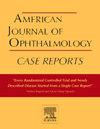Bilateral acute retinal necrosis after ofatumumab masquerading as intermediate uveitis in a patient with multiple sclerosis
Q3 Medicine
引用次数: 0
Abstract
Purpose
To report an unique case of bilateral acute retinal necrosis (ARN) associated with ofatumumab use masquerading as intermediate uveitis in a patient with multiple sclerosis.
Observation
A 47-year-old female with multiple sclerosis was transitioned to ofatumumab (Arzerra/Kesimpta, Novartis, Cambridge, MA, USA) for better systemic control of her disease. Two months later, she developed floaters with a scotoma in her right eye. Initially, she was diagnosed with intermediate uveitis secondary to a presumed multiple sclerosis flare. However, her symptoms worsened and she was referred to Emory University. Fundus examination revealed bilateral ARN. The patient discontinued the medication and was treated with systemic and intravitreal antivirals with improvement; however, she developed a retinal detachment in her right eye that required surgical repair.
Conclusions and importance
This is a unique case of bilateral ARN after starting ofatumumab medication for multiple sclerosis. This case also highlights the importance of discerning between intermediate uveitis associated with multiple sclerosis and infectious uveitis in the setting of immunocompromise.
多发性硬化症患者双侧急性视网膜坏死后,奥图单抗伪装成中间葡萄膜炎
目的:报告一例多发性硬化症患者双侧急性视网膜坏死(ARN)与ofatumumab使用伪装成中间葡萄膜炎相关的独特病例。观察一名47岁多发性硬化症女性患者,为更好地控制其疾病,改用ofatumumab (Arzerra/Kesimpta, Novartis, Cambridge, MA, USA)。两个月后,她出现了飞蚊症,右眼出现暗斑。最初,她被诊断为中度葡萄膜炎,继发于多发性硬化症。然而,她的症状恶化了,她被转介到埃默里大学。眼底检查显示双侧ARN。患者停药后接受全身和玻璃体内抗病毒药物治疗,情况有所改善;然而,她的右眼出现视网膜脱离,需要手术修复。结论和重要性:这是一个罕见的双侧ARN病例,开始使用阿图单抗治疗多发性硬化症。该病例也强调了在免疫功能低下的情况下,区分多发性硬化症相关的中度葡萄膜炎和感染性葡萄膜炎的重要性。
本文章由计算机程序翻译,如有差异,请以英文原文为准。
求助全文
约1分钟内获得全文
求助全文
来源期刊

American Journal of Ophthalmology Case Reports
Medicine-Ophthalmology
CiteScore
2.40
自引率
0.00%
发文量
513
审稿时长
16 weeks
期刊介绍:
The American Journal of Ophthalmology Case Reports is a peer-reviewed, scientific publication that welcomes the submission of original, previously unpublished case report manuscripts directed to ophthalmologists and visual science specialists. The cases shall be challenging and stimulating but shall also be presented in an educational format to engage the readers as if they are working alongside with the caring clinician scientists to manage the patients. Submissions shall be clear, concise, and well-documented reports. Brief reports and case series submissions on specific themes are also very welcome.
 求助内容:
求助内容: 应助结果提醒方式:
应助结果提醒方式:


